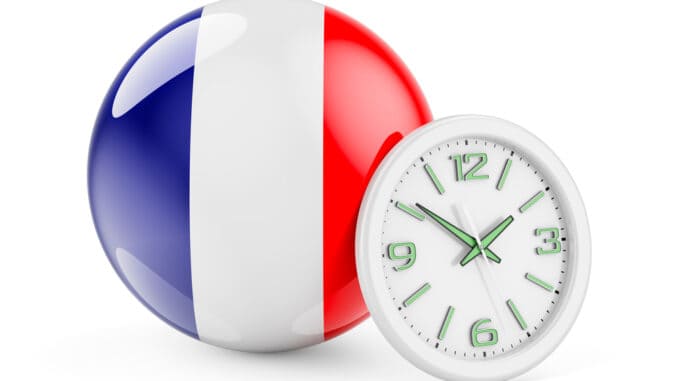
We know what you’re thinking. France is just one country, right? Surely, it should have one or two time zones, max? Well, no. It has much more than that. But, how many time zones are there in France?
France has a whopping 12 distinct time zones. It has more time zones than any other country on the planet. The only countries that even come close are the USA and Russia, with 11 apiece. This is because the country of France isn’t just limited to that small part of Europe, but the country spreads around the globe.
Let’s explain a bit more about what we mean, shall we?
What Are The French Time Zones?
Parts of France are spread around 12 different time zones:
- Mainland France (UTC+1)
- Mayotte (UTC+3)
- Reunion (UTC+4)
- French Polynesia (UTC-10)
- The Marquesas Islands (UTC-9:30)
- Gambier Islands (UTC-9)
- New Caledonia (UTC+11)
- Clipperton Island (UTC-8)
- Wallis and Futuna (UTC+12)
- Kerguelen Islands, Crozet Islands (UTC+5)
- Guadeloupe, Martinique, Saint Barthelemy, Saint Martin (UTC-4)
- French Guiana, Saint Pierre, Miquelon (UTC-3)
That’s 12 different time zones that hold a part of France in them. This means that France can be found in half of all time zones on this planet. If it wanted, it could even place itself in a 13th one (UTC+0), although it has opted not to do so to keep some sort of time parity with the rest of mainland Europe.
Why Does France Have So Many Time Zones?
You can thank colonialism for this. France, like many other European countries, was heavily involved in colonialism for a good few hundred years. France spread its wings far and wide, trying to get a slice of the pie in every corner of the globe. They didn’t quite hold the most amount of the territory, but they did well enough.
As was customary at the time, when colonists settled in an area, that area would become part of the settling country. It would live by its rules, customs, etc. This is why places like Canada, Australia, etc. all share a monarch with the United Kingdom. When the UK settled there, they became British territories. Over time, they gained their independence, but the rules and customs that they had been living by for centuries stuck. Back to France.
All of the places that we mentioned above are considered part of France. They are territories of France. They aren’t separate countries. A person who is a citizen of France can legally live in any one of those places without issue. If you traveled to any one of them from within France, it is just a domestic flight. Interestingly, not only does France have the most time zones on this planet, but it also has the lengthiest internal flights. You can fly from France to a place just outside of Australia and will never have touched soil that doesn’t belong to France.
Now, we know what you are thinking here. The UK held more territories than France, right? So, why doesn’t the UK have more time zones? Well, this is due to how colonialism ended.
When the British Empire was wrapping up, the country was happy to grant the various territories their independence. Jamaica and Canada, for instance. They would always have those ties to the UK, but they were now going to be countries in their own right. The UK retained a few smaller territories, which does mean that British soil can be found in multiple time zones, but nowhere near to the extent that sections of France can be.
When the French Empire collapsed, they did hand off a few pieces of their land. Sold some of it off. However, a lot of the places that were asking for independence were never granted it. To be fair, a lot of these places were fairly empty when France settled there, so it didn’t see the places as anything but France. It wanted to maintain its territories as best as it could. So, a good chunk of the islands that France had established settlements on had stayed under the French banner.
This means that multiple French territories are still regarded as part of France. Nowadays, there seems to be no drive for independence from any of these territories, which means that they are going to remain part of France for the foreseeable future, and it means that France will continue to exist in 12 different time zones.
It is worth noting that some of these places are classed as an ‘overseas country’ in French law, although the French courts have clarified this does not mean that they are separate from France. They are still the same country. That is more for administrative purposes.
Does France Use DST?
It depends on the territory that you are in.
While mainland France does use DST, not all of its territories will do so.
The closer a territory is to the equator, the less chance it has of using DST. This is because there is no need for them to follow DST. They have enough sunlight throughout the year that it doesn’t matter.
If you are traveling to a place in France (outside of mainland France), then you will likely want to check whether they are on DST in advance. Remember, territories in the southern hemisphere may have DST at different times of the year from what you are used to.
Final Thoughts
Due to the number of territories that France still holds, the country exists in 12 different time zones. This is 50% of all time zones on the planet.
This means that France covers more time zones than any other country in the world. The only countries that come close, the USA and Russia, are there due to their sheer size.
Other ex-colonist countries do not have anywhere near the same number of time zones as France, this is because those countries handed back most of their territory in the 20th Century.
